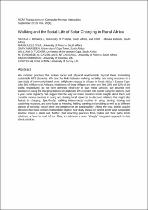JavaScript is disabled for your browser. Some features of this site may not work without it.
- ResearchSpace
- →
- Research Publications/Outputs
- →
- Journal Articles
- →
- View Item
| dc.contributor.author |
Bidwell, NJ

|
|
| dc.contributor.author |
Siya, M

|
|
| dc.contributor.author |
Marsden, G

|
|
| dc.contributor.author |
Tucker, WD

|
|
| dc.contributor.author |
Tshemese, M

|
|
| dc.contributor.author |
Gaven, N

|
|
| dc.contributor.author |
Ntlangano, S

|
|
| dc.contributor.author |
Robinson, S

|
|
| dc.contributor.author |
Eglington, KA

|
|
| dc.date.accessioned | 2014-01-13T07:17:16Z | |
| dc.date.available | 2014-01-13T07:17:16Z | |
| dc.date.issued | 2013-09 | |
| dc.identifier.citation | Bidwell, N.J, Siya, M, Marsden, G, Tucker, W.D, Tshemese, M, Gaven, N, Ntlangano, S, Robinson, S and Eglington, K.A. Walking and the social life of solar charging in rural Africa. ACM Transactions on Computer-Human Interaction, vol. 20(4), pp 22:1-22:33 | en_US |
| dc.identifier.issn | 1073-0516 | |
| dc.identifier.uri | http://delivery.acm.org/10.1145/2500000/2493524/a22-bidwell.pdf?ip=146.64.81.115&id=2493524&acc=ACTIVE%20SERVICE&key=C2716FEBFA981EF16F26307A25115533B16AE41C93EF03EC&CFID=397203734&CFTOKEN=75895227&__acm__=1389168529_1c94ca9ce431a3538a4262a0c8345b9e | |
| dc.identifier.uri | http://hdl.handle.net/10204/7137 | |
| dc.description | Copyright: 2013 ACM Digital library. This is an ABSTRACT ONLY. The definitive version is published in ACM Transactions on Computer-Human Interaction, vol. 20(4), pp 22:1-22:33 | en_US |
| dc.description.abstract | The authors consider practices that sustain social and physical environments beyond those dominating sustainable HCI discourse. They describe links between walking, sociality, and using resources in a case study of community-based, solar, cellphone charging in villages in South Africa’s Eastern Cape. Like 360 million rural Africans, inhabitants of these villages are poor and, like 25% and 92% of the world, respectively, do not have domestic electricity or own motor vehicles. They describe nine practices in using the charging stations they deployed. They recorded 700 people using the stations, over a year, some regularly. The authors suggest that the way we frame practices limits insights about them, and consider various routines in using and sharing local resources to discover relations that might also feature in charging. Specifically, walking interconnects routines in using, storing, sharing and sustaining resources, and contributes to knowing, feeling, wanting and avoiding as well as to different aspects of sociality, social order and perspectives on sustainability. Along the way, bodies acquire literacies that make certain relationalities legible. Their study shows they cannot assert what sustainable practice means a priori and, further, that detaching practices from bodies and their paths limits solutions, at least in rural Africa. Thus, they advocate a more “alongly” integrated approach to data about practices. | en_US |
| dc.language.iso | en | en_US |
| dc.publisher | ACM Digital Library | en_US |
| dc.relation.ispartofseries | Workflow;11674 | |
| dc.subject | South African eastern Cape villages | en_US |
| dc.subject | Computer-human interaction | en_US |
| dc.subject | Cellphone charging | en_US |
| dc.subject | Topokinesis | en_US |
| dc.subject | Embodiment | en_US |
| dc.subject | Solar charging | en_US |
| dc.title | Walking and the social life of solar charging in rural Africa | en_US |
| dc.type | Article | en_US |
| dc.identifier.apacitation | Bidwell, N., Siya, M., Marsden, G., Tucker, W., Tshemese, M., Gaven, N., ... Eglington, K. (2013). Walking and the social life of solar charging in rural Africa. http://hdl.handle.net/10204/7137 | en_ZA |
| dc.identifier.chicagocitation | Bidwell, NJ, M Siya, G Marsden, WD Tucker, M Tshemese, N Gaven, S Ntlangano, S Robinson, and KA Eglington "Walking and the social life of solar charging in rural Africa." (2013) http://hdl.handle.net/10204/7137 | en_ZA |
| dc.identifier.vancouvercitation | Bidwell N, Siya M, Marsden G, Tucker W, Tshemese M, Gaven N, et al. Walking and the social life of solar charging in rural Africa. 2013; http://hdl.handle.net/10204/7137. | en_ZA |
| dc.identifier.ris | TY - Article AU - Bidwell, NJ AU - Siya, M AU - Marsden, G AU - Tucker, WD AU - Tshemese, M AU - Gaven, N AU - Ntlangano, S AU - Robinson, S AU - Eglington, KA AB - The authors consider practices that sustain social and physical environments beyond those dominating sustainable HCI discourse. They describe links between walking, sociality, and using resources in a case study of community-based, solar, cellphone charging in villages in South Africa’s Eastern Cape. Like 360 million rural Africans, inhabitants of these villages are poor and, like 25% and 92% of the world, respectively, do not have domestic electricity or own motor vehicles. They describe nine practices in using the charging stations they deployed. They recorded 700 people using the stations, over a year, some regularly. The authors suggest that the way we frame practices limits insights about them, and consider various routines in using and sharing local resources to discover relations that might also feature in charging. Specifically, walking interconnects routines in using, storing, sharing and sustaining resources, and contributes to knowing, feeling, wanting and avoiding as well as to different aspects of sociality, social order and perspectives on sustainability. Along the way, bodies acquire literacies that make certain relationalities legible. Their study shows they cannot assert what sustainable practice means a priori and, further, that detaching practices from bodies and their paths limits solutions, at least in rural Africa. Thus, they advocate a more “alongly” integrated approach to data about practices. DA - 2013-09 DB - ResearchSpace DP - CSIR KW - South African eastern Cape villages KW - Computer-human interaction KW - Cellphone charging KW - Topokinesis KW - Embodiment KW - Solar charging LK - https://researchspace.csir.co.za PY - 2013 SM - 1073-0516 T1 - Walking and the social life of solar charging in rural Africa TI - Walking and the social life of solar charging in rural Africa UR - http://hdl.handle.net/10204/7137 ER - | en_ZA |






